From a Bangkok High School to HLS
Susan Lytle Lipton LL.M. ’71 practiced securities law and was the first woman to become a partner at Greenberg, Traurig, Hoffman, Lipoff & Quentel in Florida. She then spent 10 years as an investment banker, at Goldman Sachs and then L.F. Rothschild, Unterberg, Towbin. Between 2003 and June of this year, she was chair of the Harvard Law School Fund, part of the school’s current $400 million campaign.
You spent two of your high school years in Bangkok. How did that happen?
My father was in the Army, assigned to an advisory group to the Thai army. This was 1960–before we were heavily involved in Vietnam–and there were very few U.S. military personnel there. I spent two years at an international school for Foreign Service children and children from other countries.
When and why did you decide to go to law school?
I went to the University of Miami at a time when women were basically interested in whether they had an engagement ring by their senior year. Nobody in my family had ever been a lawyer. I had just gotten back from Bangkok, and I thought I might join the Foreign Service. I became a government major, took a course on the Supreme Court and was on the Honor Council when we had a huge cheating scandal. I spent many hours trying those cases. All of those things came together and I applied.
You’ve encountered many good negotiators in both law and business, and you’ve done quite a bit of negotiating yourself. Are great negotiators born, or can they be taught?
Some people are born good negotiators, or, frankly, good manipulators. But intelligent people can learn techniques that can help them be better business negotiators. I was mentored by the two senior lawyers I worked with at Greenberg Traurig, both of whom were terrific negotiators. At HLS, I took a newly offered course from Professor Alan Stone on psychology and law, and one of the course’s goals was understanding psychological factors and their use in negotiation. I remember being very struck by the concept of needing a good psychological understanding of the person you were negotiating with. I think the courses have gotten even more sophisticated since then.
Do women negotiate differently from men?
There are certain traits that one is more likely to see in women–for example, empathy, which is a very important trait for a negotiator. Also, one of my biggest strengths was that I was not macho. Sometimes the men would get carried away with what I call the formalities of position–whether you held the meeting at your office or theirs, where you sat, and so on. I was rather bemused by some of the gamesmanship, and I concentrated instead on a straightforward methodology. Another advantage I had as a woman was that I could get people to tell me things that they might not feel as comfortable sharing with a male counterpart.
What’s your answer to those who may think Harvard Law School doesn’t need their money?
The law school runs on a loss basis if you take out the fundraising. Tuition is only about 44 percent of the budget. The endowment is actually the third lowest of any of the schools at the university. Without the fundraising, tuition would have to jump dramatically. The school couldn’t continue its great programs, couldn’t provide the financial aid, couldn’t encourage people to go into the public sector through the loan forgiveness program and couldn’t continue to increase the size of the faculty–all the things they are doing to make it an even better place.
